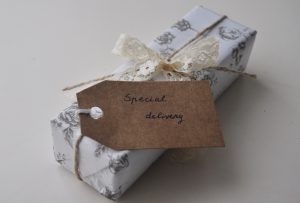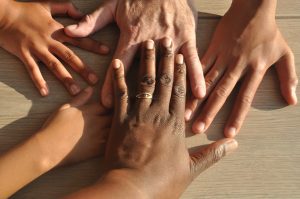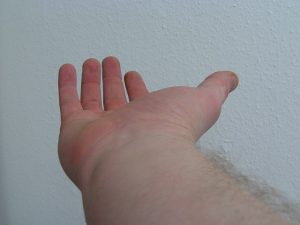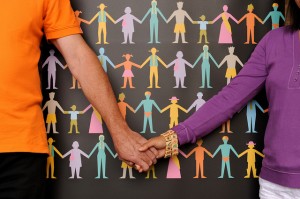
by Olga Mecking | Feb 16, 2015 | Identity, Life, Life Balance, Netherlands, World Motherhood
 I like my name. It is short, easy to pronounce, Slavic but international at the same time. I was not always fond of it but now I am. 5 years ago I changed my last name to match my husband’s and not long after that, I acquired yet a new first name: Mama.
I like my name. It is short, easy to pronounce, Slavic but international at the same time. I was not always fond of it but now I am. 5 years ago I changed my last name to match my husband’s and not long after that, I acquired yet a new first name: Mama.
I like that as well, but it is not the only name I have. There are others. Sometimes, I’m Mrs. Mecking, my husband’s wife. The woman who fills in forms and goes to the doctor, the one who studied and has a MA degree, who once held a job. Sometimes, I am known as the European Mama, blogger, writer, translator and contributor to many great sites, like World Moms Blog. For friends and family, I am simply Olga or endearments thereof.
I’ve never liked being just one thing, so it is no wonder that when motherhood threatened to take over everything, I fought back and fought hard. I didn’t want to be “just a mother”. I wanted motherhood to complement the many colours of my personality, not to repaint it.
So when I had my first child, I worked hard to finish my MA thesis. When my second child was born, I started a blog. When my son came along, I consciously decided to keep writing as soon as it was possible because already I could feel my brain being fogged over by sleep deprivation and I wanted to keep it sharp and alert. I knew if I was to remain sane, I’d have to fight against the “mommyfication”.
And fight I did. The more I wrote, the more I felt I was returning to my own self. And it felt good. Some told me “You may regret not being with them every minute of their lives, time goes so quickly”. I don’t think so. I know why I did what I did and why it was necessary.
Apparently there is a discussion whether it is OK for children to call the parents by their first names. For a long time, my children called me “mama” but my husband went by his first name. I asked them why this was the case. My eldest answered that she always thought my name was Mama. Don’t get me wrong, she knows that my name is Olga, but to her, I’m Mama.
As she begins to make more sense of the world, she figures out that there is more to her mother than just being Mama. Recently, she asked me: “Are you Olga or are you Mama?”.
I explained that my name is Olga but that I’m her mom, and that she has a name as well and that she is a daughter and a sister, and a friend and a student at school. And that she is also herself.
They say that a woman is usually remembered by her relations to someone else. Obituaries say “good wife, devoted mother, great friend”. That is not how I want to be remembered. I want to be remembered as a smart, clever, intelligent person, in short, I want to be remembered for my own sake.
And I want my children to understand that yes, I am their mother, but I am also many other things at the same time. I wear many hats. Sometimes, I am not entirely sure what I am. Sometimes I am one things and mere seconds later, I am something else.
I am always changing, always adapting, always in motion. But I wouldn’t have it any other way. Because while standing still to catch your breath is great, I know that in this case, to stand still is to stagnate. It’s not that I dislike being a mother, but the only way I can enjoy it it’s when I can be something else for a change. I want to be Mama, but I also want to be Olga, Mrs. Mecking or The European Mama. I want to be able to change my names like I change my clothes and wear something new every day.
What about you? Do you mind being “Mama” or do you prefer to have many names?
This is an original post to World Moms Blog by The European Mama, Olga Mecking of The Netherlands. Photo credit: Mike Licht. This picture has a creative commons attribution license.
Olga is a Polish woman living in the Netherlands with her German husband. She is a multilingual expat mom to three trilingual children (even though, theoretically, only one is trilingual since she's old enough to speak). She loves being an expat, exploring new cultures, learning languages, cooking and raising her children. Occasionally, Olga gives trainings in intercultural communication and works as a translator. Otherwise, you can find her sharing her experiences on her blog, The European Mama. Also take a while to visit her Facebook page .
More Posts - Website
Follow Me:




by Mirjam | Jan 12, 2015 | Childhood, Kids, Life Lesson, Motherhood, Netherlands, Uncategorized
 I had a little ritual with my son when he used to be little.
I had a little ritual with my son when he used to be little.
Sometimes when snuggling I would sit him down and tell him a little story.
I would tell him about the biggest most precious gift I ever received.
It has been ages since I told him that little story, but I still remember my son’s eyes turning big in anticipation as I got to the end of the story, revealing what the gift was.
“The gift was you,” I said.
And I proceeded to tell him how happy the gift made me and how loved he was.
No matter how many times I told him the same story, he never got tired of hearing it.
And I never got tired of telling him the same story.
I had promised myself very early on in life that if I ever had children, I would make sure they knew they were loved. As far as I was concerned, they would never have to deal with low self esteem or feel unwanted.
For most of my childhood, I spent time excusing myself for being me.
I tried to change myself, copy others, or suppress things that were typically me.
I apologized a lot. When you spend that much time being aware of what you are not supposed to be, you’re under a lot of pressure.
I used to bite my nails almost to the point of bleeding and I was shy and clumsy.
I broke things, I fell a lot, I bumped into things. It was a hard task, trying not to be me.
Today when I look at my middle child, who is almost like a copy-print of me, I laugh at my attempts.
That kid is so present, so alive, so wild, so loud, so emotional, so outspoken, so amazing.
There is no way to tone that down. And what a waste would it be to do so.
My kids have taught me that it is okay to be exactly who you are and that the flaws and the twitches are what makes a person unique.
My kids have helped me accept myself. I see myself when my daughter is persistent. I see myself when my oldest child gets emotional, I see myself when my kids do silly dances and I see myself when one of them nestles on the couch and disappears in a book.
It doesn’t bother me that my daughter feels too shy to speak around strangers, or that my son is difficult when he feels overwhelmed. Nor does it bother me that my daughter is chaotic and would forget to bring her own head to school, if it wasn’t attached to her body.
I see me.
Whenever I look at my kids, really look at them, my heart bursts with love.
I have always promised myself that whenever I had kids, I would give them the space to be themselves.
What I never expected was that through my love for them, I would learn to love and accept myself more.
And that is truly a gift.
What gift have your kids added to your life?
This is an original post to World Moms Blog by Mirjam of The Netherlands. Photo credit to the author.
Mirjam was born in warm, sunny Surinam, but raised in the cold, rainy Netherlands.
She´s the mom of three rambunctious beauties and has been married for over two decades to the love of her life.
Every day she´s challenged by combining the best and worst of two cultures at home.
She used to be an elementary school teacher but is now a stay at home Mom. In her free time she loves to pick up her photo camera.
Mirjam has had a life long battle with depression and is not afraid to talk about it.
She enjoys being a blogger, an amateur photographer, and loves being creative in many ways.
But most of all she loves live and laughter, even though sometimes she is the joke herself.
You can find Mirjam (sporadically) at her blog Apples and Roses where she blogs about her battle with depression and finding beauty in the simplest of things. You can also find Mirjam on Twitter and Instagram.
More Posts - Website
Follow Me:



by Olga Mecking | Dec 15, 2014 | Motherhood, Netherlands, Parenting
 When people find out I have three kids, they tell me: “Oh you must have your hands full.” Many mom bloggers rage against this because they feel that there’s contempt hidden behind these words. They feel it means that we have too many children, that we are crazy, out of control and have no idea what we’re doing. Which may be partially correct but not very helpful. Others offer tips what to say instead of “You have your hands full” and except for “enjoy every moment”, I agree with all of them.
When people find out I have three kids, they tell me: “Oh you must have your hands full.” Many mom bloggers rage against this because they feel that there’s contempt hidden behind these words. They feel it means that we have too many children, that we are crazy, out of control and have no idea what we’re doing. Which may be partially correct but not very helpful. Others offer tips what to say instead of “You have your hands full” and except for “enjoy every moment”, I agree with all of them.
Personally, I don’t mind being told I have my hands full because it is the truth.
I walk away and smile because these people have no idea how right they are.
Of course my hands are full. How can they not be, with three kids? They are full of little clothes to wash, dinners and snacks to prepare, toys to buy and clean up.
They are full of little warm bodies to hug and cuddle, of tiny hands to hold and of heads to caress.
In the moments that my hands are not busy with children’s affairs, they can usually be found holding a book, typing away at the computer. But mostly, they are writing about the kids anyway, just like they’re doing now. Sometimes, they’re doing nothing for a change, which is also nice.
But my hands are not the only thing that is full with my children.
No matter whether they are around or not, my head is full of thoughts of them. “Will K. like it?” and “How is J. doing at daycare?” and “M is so active, what a fun little boy!”
I think about them. I worry about them. I miss them. I am happy for them. Sometimes, I am even angry with them or feel sad about something they did. Yes, one way or another, my head is full as well.
And so is my mouth because many words that come out of my mouth are about my kids. I tell them I love them, I ask them about their day, I tell them to clean up after themselves. I talk to them. I read books to them. I sing for them. I kiss little cheeks and noses and make ouchies magically disappear with my kisses. I talk about them a lot, maybe even too much. Sometimes, the words that I say are “I am so tired”. Sometimes, they are not even meant for children, but they were definitely “inspired” by them.
My eyes are full of my children as well, when I watch them play or sing or make a mess. When they want to show me something. “Mama, look, look, looook!” Of course, I have to look to see what they’ve painted or built with DUPLO blocks. I have the kids before my eyes when I look at toys or clothes and try to find the prettiest ones.
Sometimes, this fullness is all too much. Sometimes, I need to step back, lie down, clear my thoughts and just be alone. Be empty, in a good way, even if just for a moment.
To let my hands, my head and my eyes rest.
But my heart will never rest because without the heart’s involvement, the actions of my hand, head and mouth wouldn’t mean anything. My heart will always be full of the love I feel for my kids, no matter how annoyed, tired or cranky I am.
Yes, I am so full.
My hands are full.
My head is full.
My eyes are full.
But my heart is the fullest of them all.
What are some of the ways in which your children make you feel fulfilled?
This is an original post to World Moms Blog by Olga Mecking of The Netherlands. Photo credit: le vent le cri. This picture has a creative commons attribution license.
Olga is a Polish woman living in the Netherlands with her German husband. She is a multilingual expat mom to three trilingual children (even though, theoretically, only one is trilingual since she's old enough to speak). She loves being an expat, exploring new cultures, learning languages, cooking and raising her children. Occasionally, Olga gives trainings in intercultural communication and works as a translator. Otherwise, you can find her sharing her experiences on her blog, The European Mama. Also take a while to visit her Facebook page .
More Posts - Website
Follow Me:




by Mirjam | Oct 13, 2014 | 2014, Childhood, Cultural Differences, Family, Life Lesson, Netherlands, Uncategorized
 I’ve always had trouble knowing where to fit in. I have never known which box I was supposed to climb in or which label to stick on my forehead.
I’ve always had trouble knowing where to fit in. I have never known which box I was supposed to climb in or which label to stick on my forehead.
I was born in Surinam, but most of my life I have lived in the Netherlands.
My parents had a strong sense of culture and raised me accordingly.
We lived in a small town in the northern part of Holland that did not have many people of color.
Needless to say, things outside of my home were very different to things inside.
In my home there were loud voices and singing, dancing and vibrant music.
Outside of the home it felt like I needed to be ashamed of my mother’s loud voice,and I tried my best not to speak too loud.
Around my family I felt at home and liked my braids and dark skin.
Outside home, old ladies would sometimes come up to me and touch my ‘strange’ hair, and make me wish my skin wasn’t making it impossible to blend in or disappear.
There was lots of loud laughter in our home. My mother would read Anansi stories and we would laugh hysterically.
Outside of the home, I could not explain to people why any story that starts with: “Dear God, can you make everyone that laughs at someone else drop dead instantly…” is going to be a really funny one.
In Surinam culture it’s very important that children learn to respect their parents and older people. You never talk back, you never raise your voice and you always look down when you are spoken to by an adult.
At school the teacher would say: Look at me when I talk to you!
At home my parents would speak to each other and family members in Sranang tongo, their native tongue. They would speak to us in a mixture of Dutch and Surinamese, we spoke to them in Dutch. With my sisters I spoke in a mixture of Dutch and Surinamese.
At school I spoke Dutch and there were so many things I could not talk about or explain because there was no word for it in Dutch.
At birthdays, we had parties with lots of family and friends coming in from everywhere, staying for dinner and sleeping over. My mother would cook lots of food, aunts would help in the kitchen and the house was filled with all of these wonderful festive smells, and we would eat until we could eat no more.
When I was invited to a party of one of my friends, we sat in a quiet circle with mostly old family members having a polite conversation and we were given a piece of cheese with a little vlag stick (it’s a Dutch thing), everyone left before dinner and there was absolutely no music.
Growing up in these two cultures thought me how to adapt. I learned how to behave and what was expected of me in each situation. And because I was such a people pleaser, by the time I was in my teens, I could blend in anywhere and everywhere. and I knew what was expected of me. I also had lots of interest in different people.
The people I called my friends were a variety of ages, colors, cultures and mixtures and I loved every one of them.
Still, I always felt different.
I’m an adult now. I married a man whose skin color is the exact opposite of mine (no matter how much sun he gets). My children are of mixed culture. Their skin color is a mixture of ours, their hair is mixed, curly but not as curly as mine, dark but not as dark as mine.
My husband sometimes plays his (terrible) Dutch songs and I sing and dance with my children to old Surinam children’s songs. When we celebrate there’s lots of family and lots of food but no music, because my husband says he can’t have a conversation with music in the background. I teach my children to respect their parents and older people, but I also teach them that it’s okay to speak up and look people in the eye.
I mostly speak Dutch, but when emotional I turn to my native tongue, although my kids hardly understand what it is that I’m talking about.
I think here. With my own family a perfect mixture of black and white, Dutch and Surinam, east and west, I fit here.
Do you have a mixture of cultures in your family? How do you adapt?
This is an original post to World Moms Blog by Mirjam of The Netherlands.
Photo credit to the author.
Mirjam was born in warm, sunny Surinam, but raised in the cold, rainy Netherlands.
She´s the mom of three rambunctious beauties and has been married for over two decades to the love of her life.
Every day she´s challenged by combining the best and worst of two cultures at home.
She used to be an elementary school teacher but is now a stay at home Mom. In her free time she loves to pick up her photo camera.
Mirjam has had a life long battle with depression and is not afraid to talk about it.
She enjoys being a blogger, an amateur photographer, and loves being creative in many ways.
But most of all she loves live and laughter, even though sometimes she is the joke herself.
You can find Mirjam (sporadically) at her blog Apples and Roses where she blogs about her battle with depression and finding beauty in the simplest of things. You can also find Mirjam on Twitter and Instagram.
More Posts - Website
Follow Me:



by Olga Mecking | Oct 6, 2014 | 2014, Being Considerate, Caring, Helping, Humanity, Life Balance, Netherlands, World Motherhood
 My eldest daughter and I are waiting in line at the chocolaterie. We both love ice cream and we’re discussing which one we would like best. My girl is impatient, giddy, excited. She wants ice cream and she wants it right now! But she can’t have it just yet because the older gentleman right in front of us is not done with his purchase.
My eldest daughter and I are waiting in line at the chocolaterie. We both love ice cream and we’re discussing which one we would like best. My girl is impatient, giddy, excited. She wants ice cream and she wants it right now! But she can’t have it just yet because the older gentleman right in front of us is not done with his purchase.
He takes his time picking his pralines – the choice is huge and all of them look delicious. Pistachio. Orange liqueur. Coconut. With or without nuts. He can’t make up his mind, but until he does, we can’t get ice cream. My girl grows more and more impatient. “I want ice cream, why do we have to wait for so long?” The gentleman makes his picks, but asks the lady to make another bag of pralines for him, which she does. And then he asks her to gift wrap each little bag separately. She’s not that quick either, the lady behind the counter, and she takes her time, choosing the best fitting box, the right colour of ribbon to go with the chocolate box.
In all honesty, I am growing somewhat impatient too. My child is close to having a tantrum. I have a tram to catch to go back home, errands to run, a dinner to cook. But I wait. Because if that was me, I would appreciate other people’s patience so that I would be able to buy a beautiful gift for someone I care about.
And that’s what I tell my daughter: that we need to wait sometimes, be patient, try to walk a mile in someone else’s shoes.
Soon enough, we get our ice cream. I take pistachio and mango, she takes strawberry and vanilla. After all, we had a lot of time to choose our flavours. And then, we’re on our merry way back home.
Since then, I’ve been trying to stick to this one sentence: “If that had been me”. If that had been me, I would want someone to help me, I think when I see a heavily pregnant woman picking something up from the floor. Or when I notice an older gentleman reaching for some item at the supermarket but struggling because his hands are shaking so badly. Or whenever I see someone who may need help. Putting myself in their situation helps me relate to people more, making me get out of my shell and offer help. It’s tricky sometimes. I am an introvert who would rather not talk to people unless she really had to. So asking someone if they need help is not that easy at all. But I do it, because the gratitude and relief people feel when they get the help they need is absolutely amazing.
Of course I can’t always rely on “if that had been me”. Sometimes I think people need help when they’re doing just fine, thank you very much. I once saw a pregnant woman in the street, hugging her belly in pain. She was in the last month, ready to give birth at any time. On the ground beside her was a heavy-looking bag with groceries. I approached her and asked if there was anything I could do. I was afraid that she was having contractions! She said everything was fine, and I really hope it was.
You can’t help someone who doesn’t want or need to be helped.
Neither should “If that had been me” be used to judge other people. “If that was me, I’d never let my children watch TV, eat sweets or behave like this”. Maybe you wouldn’t do these things, but I am sure you’d make other mistakes, so relax.
But when you’re out and about running errands, going about your day, or just going for a walk, look around, notice all these people and ask yourself, “if that was me, what would I need?”. And then go on and ask. Because it’s not really about you: it’s about other people. The very worst that could happen is that they won’t want or need you, but if they do, you’d be glad you asked.
Do you stop to help strangers? How do they react?
This is an original post to World Moms Blog by Olga Mecking, The European Mama, of The Netherlands.
Photo credit: Richard North. This picture has a creative commons attribution license.
Olga is a Polish woman living in the Netherlands with her German husband. She is a multilingual expat mom to three trilingual children (even though, theoretically, only one is trilingual since she's old enough to speak). She loves being an expat, exploring new cultures, learning languages, cooking and raising her children. Occasionally, Olga gives trainings in intercultural communication and works as a translator. Otherwise, you can find her sharing her experiences on her blog, The European Mama. Also take a while to visit her Facebook page .
More Posts - Website
Follow Me:




by Olga Mecking | Sep 8, 2014 | Cultural Differences, Culture, Netherlands, World Motherhood
 As a trainer in intercultural communication and mom to multilingual children, I am always taught to accept other cultures, various ways of thinking and perspectives of looking at the world.
As a trainer in intercultural communication and mom to multilingual children, I am always taught to accept other cultures, various ways of thinking and perspectives of looking at the world.
I may of course have a lot to learn about tolerance but I like to think that I’m doing a decent job at understanding all the different viewpoints. But there is a place where my tolerance stops.
One thing I have no understanding for is woo and quackery. The argument, “but indigenous tribes in enter-remote-location-here have been using this plant for ages and it cured all diseases” is useless when scientific research shows that said plant doesn’t work at all or can even be poisonous.
Unfortunately many people believe this stuff and it can have dangerous consequences. And then it gets worse.
Advocates of female circumcision claim that it’s a part of their cultural heritage and without it women feel they are not “real” women. But any cultural tradition that is based on suffering and disfigurement of the human body should be gotten rid of very quickly and no amount of cultural appreciation will suffice for me to accept such a tradition.
Let’s also remember that culture, while it brings people together and helps them get along better and makes sense out of their environment, can also smash our individualism and make us unhappy.
But as dangerous and untrue these claims are, it gets worse. Women get killed, raped, disfigured and humiliated every day. They are afraid to go out on the streets in the evenings; they take great care in picking their clothes out of fear of being proclaimed “indecent”.
In many parts of the world, people kill each other over cultural, religious or political differences which are often minor. In some parts of the world, certain people are considered worse than other people.
Should we just accept it as it is, saying, “It’s another culture, we shouldn’t do anything about it, we should just appreciate our differences”? I agree that cultural diversity is great- and I myself benefit tremendously from it. But shouldn’t we be drawing a line somewhere? And if so, where should we draw it?
In her book, “Medaliony”, Polish writer Zofia Nałkowska tries to make sense of what happened during WWII in Poland. She could have put blame on the Germans, the way many Polish people did and still continue to do today. But she didn’t. Instead, she wrote, “People prepared this fate for people”, or in a better translation, “humans prepared this fate for humans.”
I guess that line should be drawn when it’s not about cultural differences anymore. When the action in question can’t be explained by traditions, cultural heritage or tolerance. In short when it’s about humans hurting or killing other humans.
A common criticism of the understanding cultures approach is that deep inside, we are all the same. Of course there are some things that are universal: we are all humans, we have hearts and brains and skins. We’re so afraid that if we start mentioning our differences, we will start comparing ourselves to others and consider some of us better.
I beg to differ. Of course we are all humans and some of the things we do are universal. But the truth is that we are an extremely varied species, on a wide spectrum of sizes, skin colours, temperaments and cultural and social backgrounds.
Saying we are all the same eradicates the wonderful differences in us and I think that’s a shame. We are all humans and all different, and if one human kills another human it’s a tragedy.
Sadly, such tragedies happen all the time. Recently, the three boys: Eyal Yifrcah, Gil-Ad Shaer, and Naftali Fraenkel disapeared and were later found dead. The #BringBackOurBoys campaign, while beautiful, did nothing to revive them. Then, the flight MH17 crushed in Ukraine. Expatica Manager Antoine van Veldhuizen was on that plane. He and other victims of the plane crash will be hugely missed and the Netherlands are in mourning.
We like to say that humans are great with making sense out of tragedies. They need to feel that they suffered for a reason. Again, I beg to differ. Suffering and pain don’t make sense. We can certainly make sense out of them but to do so means to accept that and this is something I’ll never ever do.
Humans killing humans doesn’t make sense. And no amount of cultural appreciation classes or tolerance will convince me otherwise. Before you see someone as a part of a certain culture or religion, you’d better see the individual human first.
Our differences shouldn’t divide us. They should bring us together.
But above all, being different is no excuse to kill other people.Because nothing ever is an excuse to kill, nor should it be.
Instead, killing other people should be considered the shocking and saddening tragedy that it is and nothing should ever change that.
This is an original post for World Moms Blog by Olga Mecking, The European Mama, from the Netherlands.
Photo credit: DIBP images. This picture has a creative commons attribution license.
Olga is a Polish woman living in the Netherlands with her German husband. She is a multilingual expat mom to three trilingual children (even though, theoretically, only one is trilingual since she's old enough to speak). She loves being an expat, exploring new cultures, learning languages, cooking and raising her children. Occasionally, Olga gives trainings in intercultural communication and works as a translator. Otherwise, you can find her sharing her experiences on her blog, The European Mama. Also take a while to visit her Facebook page .
More Posts - Website
Follow Me:




 I like my name. It is short, easy to pronounce, Slavic but international at the same time. I was not always fond of it but now I am. 5 years ago I changed my last name to match my husband’s and not long after that, I acquired yet a new first name: Mama.
I like my name. It is short, easy to pronounce, Slavic but international at the same time. I was not always fond of it but now I am. 5 years ago I changed my last name to match my husband’s and not long after that, I acquired yet a new first name: Mama.
















